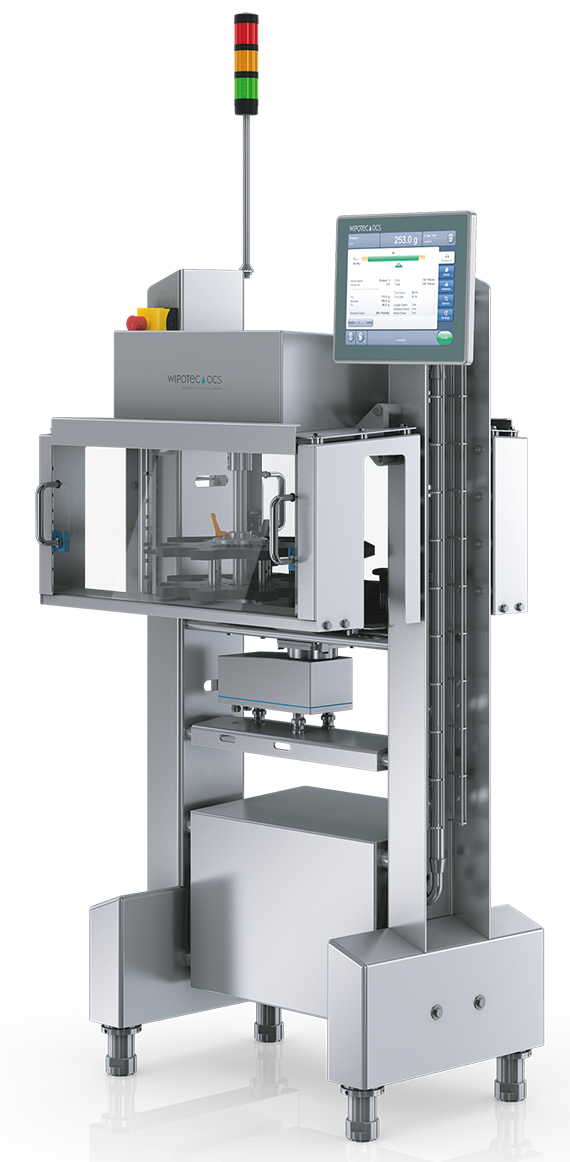What Is a Checkweigher and Why Is It Critical in Aerosol Production?
A checkweigher is an automated system designed to verify the weight of products during production. In aerosol filling lines, its role is to ensure each unit meets specified weight requirements before packaging. This is essential for regulatory compliance, cost control, and consistent product quality.
By identifying underfilled or overfilled products in real time, checkweighers help manufacturers avoid costly product recalls and maintain brand integrity. They also play a key role in minimizing waste and optimizing production efficiency.
How Does a Checkweigher Work?
Checkweighers operate by measuring the weight of individual items as they pass through a dynamic weighing platform—typically a belt conveyor with load cells integrated into the weighing section. The system captures the weight of each product, compares it to predefined limits, and then takes automated action:
-
Within weight limits: The product continues on the line.
-
Outside limits: The product is rejected and diverted from the line.
Modern checkweigher systems include touchscreen interfaces, programmable logic controllers (PLCs), and integration with SCADA or MES systems for production monitoring and reporting.
In Which Industries Are Checkweighers Commonly Used?
Checkweighers are vital across a wide range of industries where accuracy and compliance are critical:
-
Aerosol and Cosmetics: For deodorants, hairsprays, and body sprays
-
Pharmaceuticals: For pressurized metered-dose inhalers (MDIs) and liquid medications
-
Household Chemicals: For disinfectant sprays and air fresheners
-
Food & Beverage: For portion-controlled and packaged items
-
Automotive & Technical Products: For spray lubricants and maintenance aerosols
Especially in aerosol manufacturing, weight deviations can result in product failure or safety concerns. A robust checkweigher eliminates this risk.
What Are the Advantages of Integrating a Checkweigher in Aerosol Lines?
For aerosol filling systems, checkweighers deliver several operational and quality-related benefits:
-
Inline Quality Control: Each can is inspected instantly without slowing down the line
-
Reduced Material Waste: Incorrectly filled cans are automatically removed
-
Process Optimization: Feedback data helps identify filling issues upstream
-
Compliance Assurance: Ensures adherence to national and international weight regulations
-
Brand Protection: Prevents defective or non-compliant products from reaching the market
Sora Machine’s checkweighers are engineered for high-speed aerosol environments, offering precision and repeatability with minimal maintenance.
How Do Checkweighers Differ from Other Safety Devices?
While checkweighers are part of the safety devices in a production line, their function is distinct. Here’s how they compare to other common devices:
| Device Type | Main Function |
|---|---|
| Checkweigher | Weight control and rejection of faulty units |
| Leak Tester | Detects pressurized gas leakage in cans |
| Flame Tester | Ensures proper spray valve function |
| Pressure Tester | Verifies internal pressure against safety limits |
Checkweighers focus solely on ensuring that filled products meet target weight tolerances. They are best used in conjunction with other devices to build a complete, automated quality assurance system.
What Makes Sora Machine Checkweighers Stand Out?
Sora Machine offers advanced checkweigher systems tailored specifically for aerosol filling lines. Our units feature:
-
Stainless steel construction for hygienic and corrosion-resistant performance
-
High-precision load cells capable of handling fast-moving production lines
-
IP-rated protection against dust and moisture
-
Customizable rejection systems based on can size or product type
-
Integrated software for real-time weight data and production statistics
All units are compatible with existing Sora aerosol filling machines and can be adapted to fit various line configurations.
What Should You Consider When Choosing a Checkweigher?
Selecting the right checkweigher depends on your production specifications. Consider the following:
-
Speed Requirements: How many cans per minute must be checked?
-
Product Type: What are the dimensions, materials, and weights of your cans?
-
Accuracy Tolerance: What weight variation is acceptable?
-
Line Integration: Will the unit work seamlessly with your existing setup?
-
Environment: Is the production area humid, dusty, or exposed to cleaning agents?
Sora Machine offers both standard and customized solutions to meet these specific requirements.
Why Is Regular Maintenance and Calibration of Checkweighers Necessary?
To maintain consistent performance and legal compliance, checkweighers require periodic maintenance and calibration. Over time, mechanical wear, environmental conditions, or product buildup may affect weighing accuracy. Common risks of inadequate maintenance include:
-
False rejections or acceptance of defective units
-
Inconsistent data logging or reporting errors
-
Increased downtime due to undetected mechanical faults
Sora Machine provides after-sales support, calibration services, and spare parts to keep your checkweigher systems operating at peak efficiency.
How Do Checkweighers Support Digital Manufacturing Goals?
In a smart factory setting, checkweighers play a crucial role in process transparency and optimization. Integration with central data systems allows for:
-
Real-time production analytics
-
Batch traceability and defect tracking
-
Predictive maintenance based on machine behavior
-
Remote access and control
These capabilities align with Industry 4.0 initiatives, helping manufacturers reduce waste, improve accuracy, and enhance decision-making.
Checkweigher systems are indispensable for any high-volume, precision-driven production line—especially in aerosol manufacturing. Sora Machine delivers industrial-grade, user-focused checkweighers that guarantee accuracy, support automation, and minimize human error. With our expertise in integrated aerosol filling systems, we help you maintain full control over your product quality, regulatory compliance, and production efficiency.




